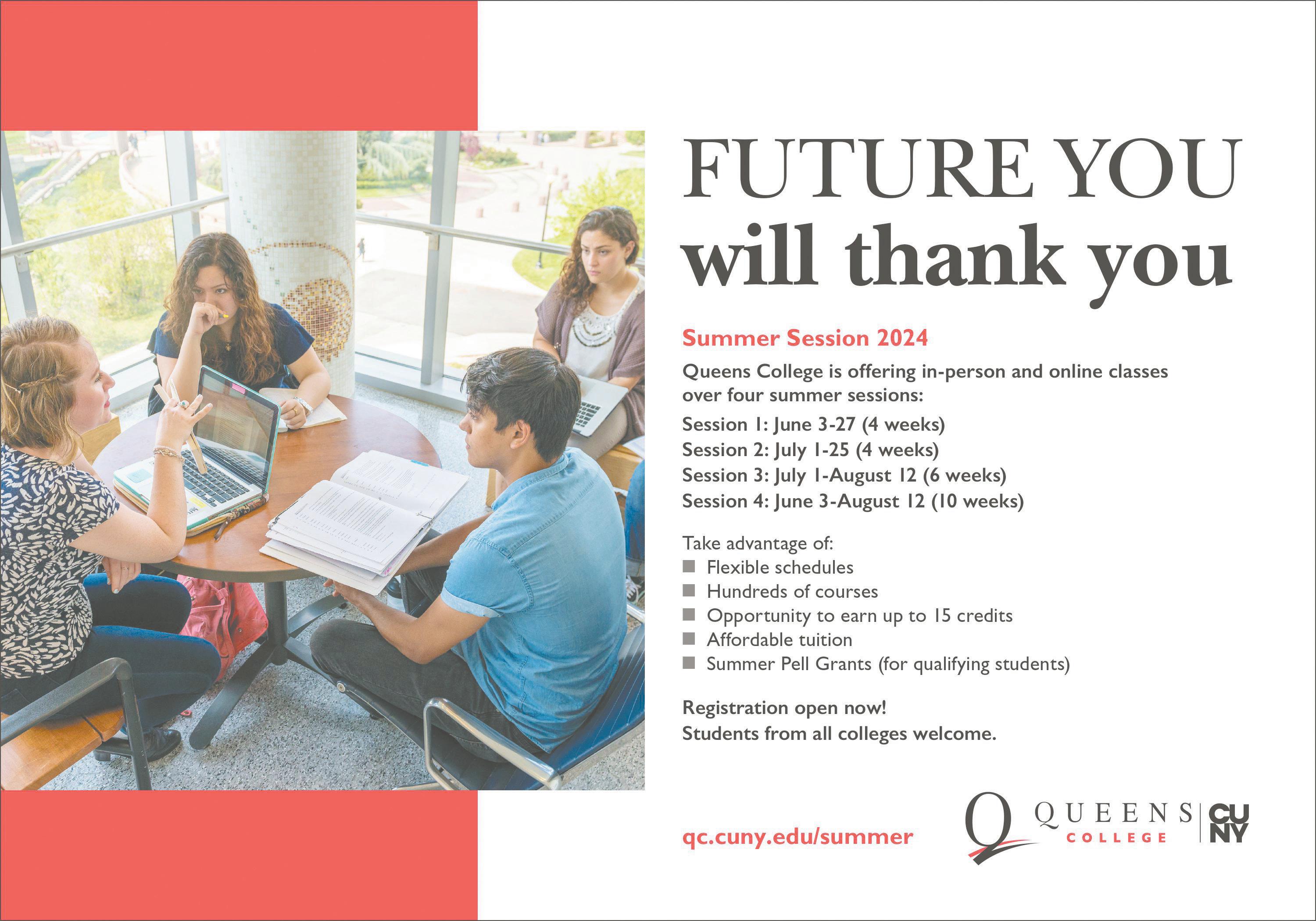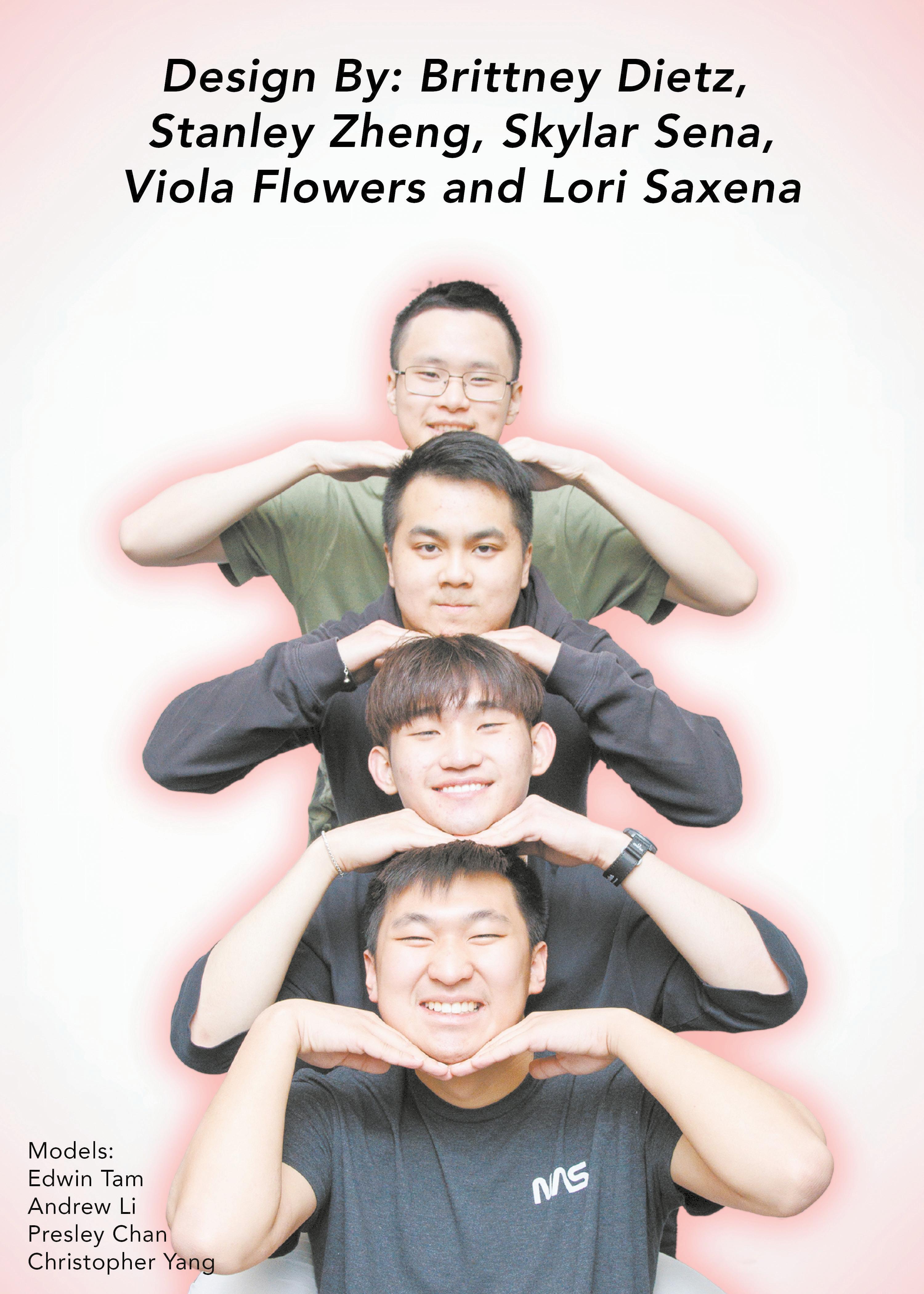










The topic of what a healthy relationship entails will never cease to spark spirited debates, as many try to get to the bottom of what “healthy” truly means or looks like.
A quick Google search of “What is a healthy relationship?” results in countless articles, blogs and public forums that aim to make sense of such a loaded term. Even government agencies have taken part in the discussion.
According to the official website of New York State, healthy relationships require “honesty, trust, respect and open communication between partners and they take effort and compromise from both people.” In fact, the webpage is called “Teen Dating Abuse Awareness and Prevention,” demonstrating a need to reach younger audiences about the perils of unhealthy relationships.
According to Domestic Violence Services, Inc., one in three “young people will be in an unhealthy or abusive relationship.”
For Joanne Davila — a clinical psychology professor and chair of the Psychology Department at Stony Brook University, as well as an expert in healthy relationships — educating youth on stable interpersonal connections and providing them with tools to use for the rest of their lives is a goal worth working towards.
Davila argues that more needs to be done to address this issue.
“I think we really need to start socializing people from an earlier age so that they have good relational skills and can make good choices in their lives and that should carry forward,” Davila said.
Davila teaches and practices a model of romantic competence, which focuses on three major components: insight, mutuality and emotion regulation.
Insight refers to one’s grasp of their own feelings and actions. “[Insight means] to understand why you do the things you do, to learn from your mistakes, to get to know other people in a way that allows you to really understand who they are,” Davila said.
Mutuality refers to the ability to meet the needs of a partner and practice empathy. Davila explained, “Everybody deserves to get their needs met, and we need to coordinate in a way that allows us to do so.”
Emotion regulation refers to “managing all the feelings that come with relationships.” According to Davila, this component helps people make good decisions and stay present while navigating their relationships.
According to the National Library of Medicine, healthy habits learned earlier in life are more likely to be retained during
adulthood. This concept coincides with Davila’s idea of implementing lessons that could have a monumental impact on people’s lives into education systems.
“I would love to see a more significant movement for teaching relationship skills in schools, we teach things like sex-ed, we teach things like violence prevention,” Davila continued. “These are all very important things to do, but they’re all about risk reduction and harm reduction, rather than about promoting wellbeing.”
Carly Santore, a senior double majoring in mathematics and applied mathematics & statistics, is in the Mathematics Teacher Education Program. When discussing the topic of introducing healthy relational habits and concepts into education systems, Santore agreed with Davila’s sentiments.
“I do believe that healthy relationships and mental wellbeing are extremely important topics for teenagers to be educated on. This curriculum can absolutely be implemented alongside sex-ed,” Santore said.
However, as someone well-versed in the New York education system, Santore noted that taking such a step is far easier said than done.
“Since New York Schools are not required to teach sex-ed, it might be difficult to lay
out the roadmap for this complicated subject matter,” she explained.
These programs do, however, exist in other states. For example, schools in Georgia are offering healthy marriage and relationship education (HMRE) courses to teach students communication skills and to set expectations for relationships.
Ultimately, Davila believes that by raising awareness and opening up the discussion surrounding healthy habits, people can be more equipped to handle their own relationships. She feels with how things currently stand, people are often provided with the resources they need for healthy relationships when it is too late — or perhaps when they have already selected a partner.
“One of the things that I think is really common and problematic is that people get super focused on this idea that if they just love the person enough, everything’s gonna work out,” Davila said. “Being really intentional when you’re selecting who you want to be with is very important, and then getting out [of a relationship] if it’s not right.”
Although implementing curricula that mirror HMRE courses in states like New York may be difficult, Davila’s methodology demonstrates that it may be worth the effort and resources.
On June 24, 2022, the United States Supreme Court abandoned the almost 50year precedent of the constitutional right to abortion with Dobbs v. Jackson Women’s Health Organization. Two monumental cases — Roe v. Wade and Planned Parenthood v. Casey — were overruled in this decision. This marks the first time that the Supreme Court has “taken away a fundamental right,” as the U.S. no longer federally protects the right to an abortion. As a result, state governments now have the authority to enact laws that ban women from accessing this fundamental medical procedure.
In our post-Roe society, many pro-choice advocates have conveyed their disappointment in the Supreme Court’s decision and are actively grieving the immense loss of the freedom to choose. Amid the public reactions to this overruling, many artists, musicians, writers and other creatives have expressed their attitudes toward the Court’s ruling. As we approach the second anniversary of the Dobbs decision, creatives in the United States continue to express their responses to this ruling through their work.
The Tulane University School of Liberal Arts featured an exhibition of artwork by Louisiana artists titled “Artists Respond: Post-Roe Louisiana” from Oct. 4-28, 2022. The exhibition featured over 30 paintings, photographs, sculptures and other forms of media that portrayed a multitude of reactions to the decision, as well as pieces of artwork that were created before the overruling but
still demonstrate similar themes of frustration over a lack of women’s rights. A panel discussion and reception also accompanied the exhibition on Oct. 13, 2022.
One of the most intriguing pieces in this exhibition was Odessa Blackmore’s painting “La Femme Fetal” (2022), which features a halfbird, half-woman shackled inside of a birdcage with an egg between her legs and a cross on her lower stomach. The woman characterized as a caged bird highlights the heightened feelings of oppression and confinement resulting from the overruling of Roe, as it restricts the freedoms that Roe provided for those seeking an abortion.
From Jan. 20 to Aug. 13, 2023, the Brooklyn Museum featured artist Mary Enoch Elizabeth Baxter’s musical documentary “Ain’t I a Woman” in a two-part exhibition that examined the U.S. history of reproductive injustice and the overturning of Roe. The opening of this exhibition “deliberately” aligned with the 50th anniversary of Roe v. Wade and its overruling that same year. Baxter’s film features a music video of an incarcerated woman giving birth in shackles. Through this multidisciplinary piece, Baxter comments on the systematic violence against women — especially women of color — and the denial of their right to choose if and when to have children.
Baxter is not the only artist to use music to express their resentment toward the Supreme Court due to the Dobbs decision. Pop singer
 BRITTNEY DIETZ/THE STATESMAN
BRITTNEY DIETZ/THE STATESMAN
Demi Lovato released a song titled “SWINE” on the first anniversary of the monumental ruling. In a post on X (formerly known as Twitter), Lovato said that she “created ‘SWINE’ to amplify the voices of those who advocate for choice and bodily autonomy.” The pop-rock song’s chorus asserts, “My life, my voice / My rights, my choice,” strongly emphasizing a person’s right to choose despite Roe’s overturning.
Despite Lovato’s intentions of criticizing the Supreme Court, many have expressed their disapproval of the song. Critics have argued that her lyrics, “It’s mine, or I’m just swine” indicate that without the right to choose, a woman is no more useful than a pig — or any birthing animal — in society. This animalistic
comparison can come off as dehumanizing and offensive to those affected by the Dobbs decision.
At the Minneapolis Institute of Art, the photography exhibition “The Last Safe Abortion” by Carmen Winant was displayed from Aug. 5 to Dec. 31, 2023. Winant’s exhibition includes “hundreds of historic, archival and contemporary photographs taken across the Midwest,” spanning from Roe’s ruling in 1973 to the Dobbs ruling. The impact of the Dobbs ruling is emphasized through photographs, capturing healthcare workers and clinics, women in mundane situations, inspirational quotes and picket signs that display pro-choice messages such as “Abort the Patriarchy” and “Motherhood by choice, not chance.”
Continued on page 4
Posters with sexually-implicit phrases can be found on the walls at every turn in the Student Activities Center, where students either cringe or chuckle at the thought of winning a sex toy at a campus event. While sex-centered events and initiatives are hosted to entertain students — or even cause a stir — they possess the additional benefit of educating young adults on how to have safe sex.
“The CPO [Center for Prevention and Outreach] office does a really good job of keeping their doors open like, ‘come in, take condoms.’ It’s hilarious,” Natalia Wong, a junior women’s and gender studies major at Stony Brook University, said. “I think taking a silly approach or having a sense of humor around it makes it less serious, makes it less awkward.”
The lighthearted advertising helps to reduce stigmas surrounding discussions of safe sex. If students are more willing to approach the topic, conversations surrounding safe sex can become much easier.
Fondue Me is one event promoting safe sex on Stony Brook’s campus. Students flock to play bingo on sex facts, watch performances and enjoy a chocolate fountain. Fondue Me is held annually and is organized by Student Engagement and Activities. This year, it took place on Feb. 10.
“Fondue Me is about getting rid of any stigma of sexuality on campus,” Madelyne Gaibor-Alban and Isaiah Daniel, the event coordinators for Fondue Me, wrote in an email

to The Statesman. “This year we introduced a new drag queen host, Astala Vista from Drag Queen Entertainment, along with performances from our Caribbean Student Organization’s Dance Team, Caribana, Belly Dancers and Music and Medicine!”
Organizations including CPO, Planned Parenthood Generation Action (PPGA) and the LGBTQ* Center were present at the Fondue Me event. These organizations operate yearround and are leading the fight in promoting sexual health on campus.
PPGA at Stony Brook is a resource for students seeking sexual health information from Planned Parenthood. The club advocates
that Planned Parenthood provides more than just prenatal care.
“Basically you can get any type of health care that you need at Planned Parenthood for very low costs,” Anika Drees, the social media manager for PPGA, said. “If you need to go to the gynecologist, just go for a checkup. They have gender affirming health care there.”
PPGA at Stony Brook offers Plan B and other contraceptives on campus whenever students need it, even on weekends and late at night. Students are also encouraged to contact Planned Parenthood with any questions they might have.
“A lot of people have been coming to get Plan B, and if they don’t understand how it works, they ask us; we tell them how it works,” Drees said. “I’m pretty hopeful with how knowledgeable the campus is and I’m hopeful that if they aren’t knowledgeable, they’d come to us.”
PPGA also hosts events of their own, recently including a fundraiser for Palestine on March 20 that collected donations for menstrual products. Other clubs contributed to the cause and hosted activities for students to enjoy at the fundraiser. Students were able to participate either by donating $5 or a pack of menstrual products.
Sexual health events and organizations are generally well-received by the student body. Fondue Me alone hosts roughly 200 students each year on average, with roughly 150 students in attendance this year.
Wong’s hope is that the conversation surrounding safe sex expands to other topics including stigmas regarding certain sexually transmitted diseases (STDs) and infections (STIs).
“I feel like if we talked more about them and made sex in general less stigmatized, less scary, it would open up the floor for talking about contraception,” Wong said. “Not just preventing babies, preventing STIs, STDs, AIDS, HIV, and also not making those things specifically ‘gay diseases,’ but diseases that anybody can get.”
College life is often described as a time for growth, independence and self-discovery, as well as a time for exploring relationships. But in the fast-paced world of higher education, relationships can often be a confusing and challenging territory to navigate. At Stony Brook University, students and spiritual leaders alike offer valuable perspectives on what constitutes a healthy and faithful relationship.
Father Sean Magaldi, a Chaplain in the Stony Brook Catholic Campus Ministry, reflected on his own experiences with students. He acknowledged the efforts that students put into understanding each other’s intentions within the ministry and on campus.
“Within the culture that I deal with regularly, I think that their ideals tend to be one of mutual respect, and I think that for the most part, they try their best to make sure it’s clear what each person’s intentions are,” he said.
Magaldi also explained how relationshipspecific terminology has evolved over the years, adding to the confusion associated with navigating relationships.
“People aren’t necessarily sure what their relationship status is from a romantic perspective, like ‘dating’ and ‘hanging out’ are words that can [mean different things],” he said. “When I was in college you were dating, and now people might say they’re hanging out.”
Regardless of the terminology used, Kayla Haz, a Catholic senior majoring in psychology, shared her beliefs on what differentiates a healthy versus an unhealthy relationship.
“Fully practicing Catholic relationships can be unhealthy if you’re not communicating well, if you’re holding grudges, if you’re not expressing what frustrates you to the other person that you love,” she said. “Then you’re just holding that in and then one day they’ll explode.”
Haz is not the only one who values this kind of intentional communication; Mar Cosme, a junior English major, shares similar ideas.
“A key to having a healthy relationship is to like your partner and to care about them,” Cosme said. “If you build off of that and some sort of basic ability to communicate, you can learn and grow with your partner.”
Magaldi also emphasized the importance of improving communication to cultivate healthy relationships.
“People think differently, and it’s important to understand we’re not mind readers. I think oftentimes people in relationships, whether romantic or just friendships or even familial relationships, assume the other person knows what they’re thinking which causes tension and friction,” he said.
But while searching for a healthy relationship, some students may be unsure of what they are looking for. As Cosme noted, “There are a lot of people who sort of
get lost sometimes and are trying to have a relationship that maybe they’re not ready for.”
To help with this internal struggle, Haz suggests students try to find themselves before looking to others.
“First we need to know ourselves before we can give a sincere gift of self,” she said.
For the students who might feel pressured by society or the college environment to get into a relationship, Magaldi shares a piece of advice on resisting the influence.

“Pressure is good in a certain sense, because think [about] when you have a deadline the pressure sometimes can help motivate. But I think that in relationships, the deadline is a lot softer, so then sometimes that pressure can be negative because you can force yourself to do something that may not be good in the long term,” he said.
Magaldi also explained how the technological world today places certain stressors on students when it comes to dating as opposed to 10 years ago, before texting and social media became more prevalent.
He explained that people “were forced to communicate verbally a lot more” and did not need to craft a perfect text to ask someone out on a date. Rather, someone who wished to ask out another would have to call the person’s home and talk to their parents in order to reach them.
Ultimately, no matter what type of relationship a person is looking for, it all depends on personal preferences, beliefs and knowing oneself to know what to expect.
“You’re giving yourself to the other person, caring about the other person, looking at love as willing the good for the other, rather than what you might be able to take from somebody else,” Magaldi said.
Although it may be a cliche, there is some truth to the trope ‘it takes a village to raise a child’ — whether it be through teachers, pediatricians, athletic coaches or politicians who create laws directly affecting youth. But in some states across the U.S., the adults in charge of youth policies are not doing their part in ensuring quality education for all.
According to an Associated Press article, GOP-led states are at risk of losing sex education curricula in their schools. This idea was amplified after the emergence of the “parents’ rights’’ movement, whose main concern is dismantling inclusive LGBTQ+ sex education. Republican leaders and parents are trying to ensure that it is the parents’ choice to allow their children to take part in any sex education.
So what can we expect in the absence of sex education at K-12 institutions if these policies are implemented?
Lack of sex education for all youth may lead to an increase in unwanted teen pregnancies and sexually transmitted infections (STIs). Since GOP state leaders tend to oppose abortion rights, minimizing unwanted pregnancy is crucial in these states to protect teens from potential physical, emotional and financial harms. In fact, teen birth rates are much higher in states that ban abortion and have minimal sex education curricula.
Moreover, the number of contracted sexually transmitted disease (STD) cases has risen again since the COVID-19 pandemic — reaching more than 2.5 million cases of syphilis, gonorrhea and chlamydia according to the CDC’s 2022 statistics.
GOP-led states are especially at higher risk; out of the top 10 states with the highest rate of STDs, eight are Republicancontrolled states.
Many of the Republican voters who oppose mandatory sex education argue that it is the parents’ responsibility to determine what constitutes appropriate sex education for their children. But this begs the question: is sex education really taught at home?
According to OnePoll, one in five parents are not willing to have conversations about sexual matters with their kids at all. Even the parents who discuss sex education with their
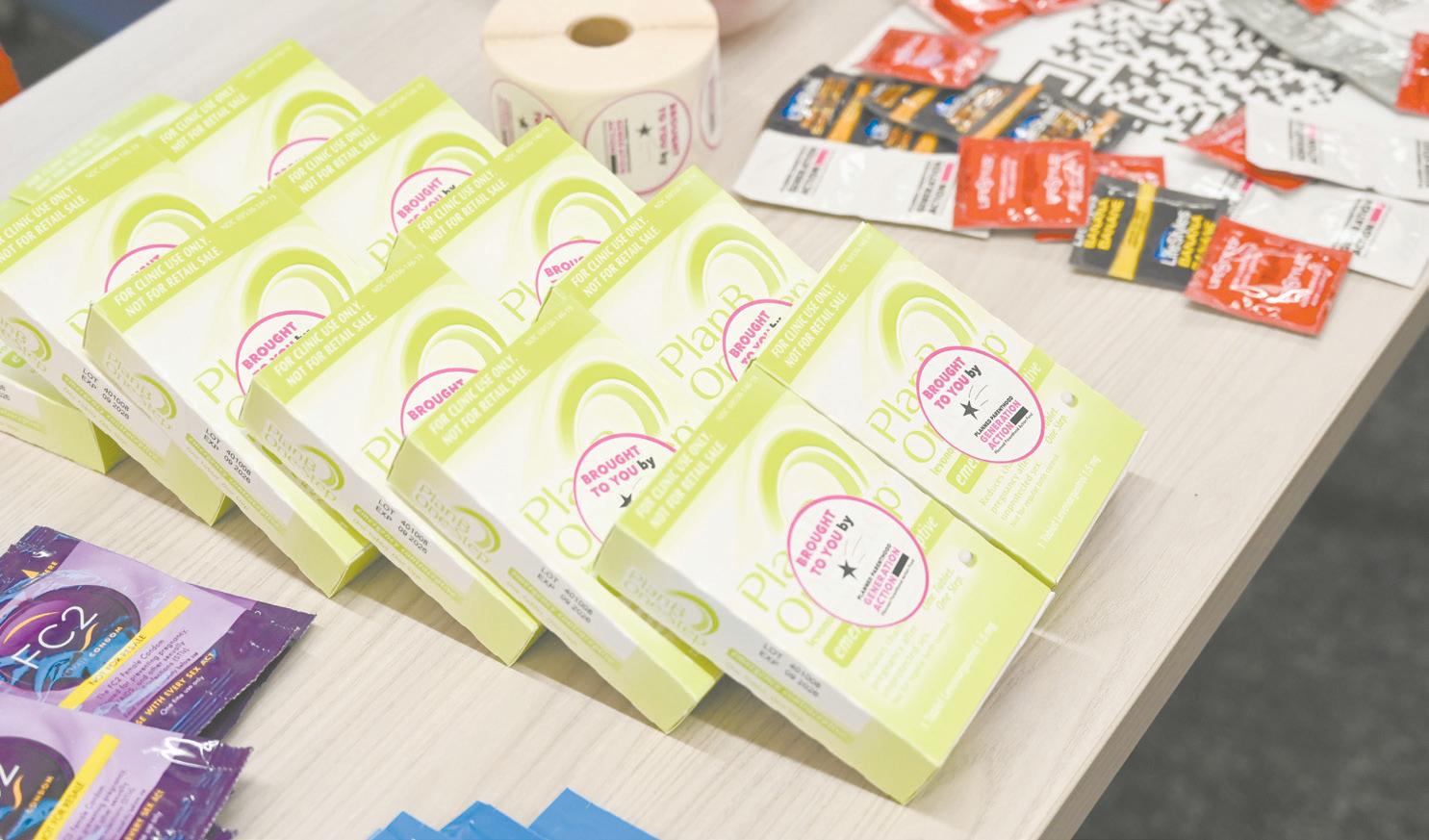 BRITTNEY DIETZ/THE STATESMAN
BRITTNEY DIETZ/THE STATESMAN
kids tend to avoid more complex topics, such as birth control and consent.
While sex education in schools is taught by qualified instructors, parents may not have the same level of professional expertise. Not only do they tend to avoid harder topics, but their own lack of education can lead to misinformation. For instance, older generations who are more socially conservative may be more likely to still believe in myths regarding sexual assault, such as victimblaming for dressing or acting in a “sexually provoking way,” or believing that victims could have prevented it if they wanted to. A study from the International Society for the Study of Individual Differences’ journal proves that individuals with sexually conservative views are more likely to accept these myths.
Furthermore, teenagers are more likely to seek sexual information from peers and teachers than parents. We must keep these resources open, allowing for spaces where minors feel comfortable participating in honest outreach discussions.
The controversy surrounding sex education in public schools has been a longstanding issue, but it significantly escalated recently in GOP-led states due to opposition from parents and politicians who are reluctant to incorporate LGBTQ+ topics. The “Don’t Say Gay Bill’’ in Florida exemplifies the strong aversion for such discussions in politically conservative states. Given that the inclusion
Continued from page 2
Winant views this project as unique compared to others in her portfolio, as she is using her art to comment “in real-time in regard to the real-world stakes.” She also desires to build a “new visual language around abortion” using her photography.
Writers have also penned their frustrations in the aftermath of the Roe overruling. Ashley Wurzbacher’s powerful article “Writing Characters in a World After the Repeal of Roe v. Wade” describes her difficulty with writing her novel that featured a female protagonist, Jada, who obtains an abortion in the “decline and fall of Roe v. Wade.” Wurzbacher desired the “right to plan” and “independent agency” while
writing — an ironic sense of control that she and her character had in the writing process but that women in the U.S. no longer had over their bodies. She hopes her novel “insists upon the dignity of choice” by providing bodily autonomy to her characters and advocating for women’s autonomy in the real world.
“The Post-Roe Monologues” is a play with music written by obstetrician-gynecologist Mimi Zieman and directed by Maria Torres. The one-night-only performance of this play was on Nov. 6, 2023 at the Kaufman Music Center in New York City. Drawing inspiration from Zieman’s first-hand experiences as a reproductive healthcare professional, “The
of LGBTQ+ sexual health in the curricula is the biggest concern among Republican-controlled states, should schools offer LGBTQ+ exclusive sex education to satisfy everyone?
The main reason why LGBTQ-inclusive sex education is important is that gender and sexually-marginalized youth are at a higher risk for sexual health issues such as STIs, sexual activity under the influence and dating violence.
LGBTQ+ youth are also far less likely to have open sex discussions with their parents. Even if they do, unless their parents are part of the community themselves, it is often difficult for kids to receive useful and accurate information specifically concerning their sexual health. It is important that schools protect LGBTQ+ youth by providing adequate education to prevent against poor health outcomes and lack of support within their homes.
Sex education is a shared responsibility between schools and parents. While schools need to provide children with quality health education, they also need a welcoming environment at home to seek answers. Instead, youth are struggling to find proper information in a world where open discussions about sex and sexual diversity are considered taboo. In each of our villages, adults and educators are responsible for ensuring safe environments and comprehensive education for all youth, including the LGBTQ+ community.
Post-Roe Monologues explores the real-world consequences of the overturning of Roe v. Wade.” The performance intended to inspire empathetic responses to the reproductive healthcare crisis resulting from the Dobbs decision. In addition to raising awareness of and starting conversations about this issue, the proceeds of the play were donated to the National Abortion Hotline and Choice Matters — two resources for abortion referrals and advocates for abortion rights.
In the wake of the consequential overruling of the Roe and Planned Parenthood cases, a surge of reactions and responses through creative work has underscored the importance of the
Since not everyone is privileged enough to receive quality sex education at home, K-12 schools provide necessary education for everyone regardless of socioeconomic status, family background and sexual orientation. When giving equal educational opportunities is the main function of primary and secondary schools, how is it acceptable to exclude one of the most important subjects?
Sex education is directly related to a person’s physical, emotional and social wellbeing. The World Health Organization defines sexual health as “a state of physical, emotional, mental and social well-being in relation to sexuality.” Teaching adolescents about sexual health ensures a better quality of life overall.
According to a sudy from the Journal of Adolescent Health conducted with adolescent women, better sexual health is associated with better social integration, higher self-esteem, less substance use and self-reported depression. Another study from the Frontiers in Reproductive Health Journal suggests that among male adolescents, mental and reproductive health are intertwined; poor sexual health leads to poor mental health and vice versa.
Hence, comprehensive sex education can prevent many health issues and encourage healthy habits in various aspects of life. Minimizing sex education curricula means young people who are not fortunate enough to have sexually accepting and knowledgeable parents will have to learn on their own while risking their sexual health.
Conservatives’ irrational fear of healthy relationships being formed between members of same sex and non-binary gender identities, along with their false beliefs of comprehensive sex education encouraging reckless sex, are putting children at risk — including their own. What may hurt their kids is delaying essential education, as well as restricting exposure to healthy homosexual love or confident transgender people. The exclusion of proper sex education may leave people with irreversible consequences, such as unwanted pregnancy, HIV or sexual trauma.
Children should be set up for success, not put in a position where they have to rely on misinformation or the internet to be taught healthy sexual habits.
right to choose. Considering the continued legal restrictions imposed on reproductive health — such as the recent Alabama Supreme Court ruling on frozen embryos — people can unfortunately expect to see similar rulings in the future, especially with the impending 2024 Presidential Election.
Artists will continue to use such monumental legal decisions as inspiration for their work, hoping to capture the attention of citizens and lawmakers. Their work highlights the emotions and consequences associated with legal principles that rule the decisions people can make about their bodies and reproductive healthcare.

Healthy relationships can come in many forms, whether platonic or romantic. From friendships to lovers, healthy relationships can look different for everyone depending on their own preferences and situations.
The Statesman gathered three pairs of people in healthy relationships on campus and asked them about their keys to success. Even if you are not in a relationship currently, we asked them for tips and tricks for our readers looking for love or new friends.
Katie
Katie Ravano, a junior biochemistry major, gave The Statesman insight into how she keeps a healthy relationship with her boyfriend.
Ravano and her boyfriend, who requested to stay anonymous, have been together for almost two and a half years, starting their journey at a Stony Brook University football game their freshman year.
They both attended the game alone but ended up sitting next to each other and chatted the entire time; the rest was history.
When asked what has helped keep their relationship healthy and stable, Ravano said, “This is kind of cheesy, but it absolutely is communication … And one thing about communication is that it has to be not immediate, but as soon as you can.”
She continued to emphasize that in a relationship, bottling up feelings regarding your partner’s actions can only intensify your emotions. She also mentioned that
laughter was a big part of keeping their relationship healthy.
Ravano also left some advice for those searching for a relationship themselves.
“The best thing to do would be to just get out there … meeting new people, even if it’s scary, is almost always gonna pay off and at the very least, you got to do something for yourself,” she said.
Julia and Liam
Next up are two long-distance students giving us their perspectives on how their relationship stays healthy over the phone.
Julia Parsons, a freshman civil engineering major, and Liam Gallagher, a freshman acting major attending Savannah College of Art and Design in Georgia, started dating around a year ago.
They met in their freshman year of high school but were never really close until their senior year when they were cast as best friends in their school’s rendition of the musical “Newsies,” with Julia playing David Jacob and Liam playing Jack Kelly — both leading roles.
Parsons and Gallagher agree with Ravano on the importance of communication, especially with the distance between them. “We kind of do periodic debriefs to be like, ‘Where are you in regards to how this is working out?’” Gallagher explained.
These check-ins are what they claim keep their relationship healthy. Parsons
added that she feels being long-distance has actually helped their relationship.
“I think it’s helped us connect in more emotional ways since we can’t connect physically and be physically present with each other,” Parsons said.
When asked what tips they might have for other students struggling in longdistance relationships, Parsons emphasized the importance of finding “what works for you.”
“All of the long-distance advice tips videos I would get would be like, ‘FaceTime every night, visit each other on the weekends,’ and obviously that’s not possible for us,” she said. “Even if it’s not what works for the majority of other people, if it works for you, that’s all that matters.”
Alexa and Paul
Next are two best friends who described how they keep their friendship in a healthy place.
Alexa Grimley, a junior linguistics major, and Paul Manzo, a senior psychology major, became close friends during the spring semester of their freshman year.
They are both members of Pocket Theatre, an on-campus club that produces plays and musicals every semester. They ended up costarring in the musical “The Addams Family,” with Grimley as Morticia Addams and Manzo as her husband, Gomez Addams.
As the years went on, Grimley and Manzo both gained executive board positions in Pocket Theatre: Grimley as the president and Manzo
as the vice president. This gives their friendship a different dynamic because they must balance both the professional and personal aspects of their relationship.
“Because we’re in a leadership position together, communication is key on a lot of things,” Grimley said. “Sometimes we disagree on things about Pocket and we have to communicate that as president [and] vice president, but also as friends.”
The key to their healthy relationship is always being on the same page. This does not pose a problem for Grimley and Manzo, as they claim to have “the same brain.”
“They say opposites attract. That couldn’t be further from the truth with me and Alexa,” Manzo said.
“It happens all the time that we will say the exact same sentence and it’s just bizarre,” Grimley continued.
Manzo gave some advice about how other students can find lasting friendships on campus.
“Just approach every person the same exact way, whether you’ve known them for five seconds or five years,” Manzo said. “You’ll find that you guys have stuff in common or you have differences that complement each other.”
Seawolves seem to especially prioritize communication, whether it be in long-standing Stony Brook love stories or as friends on the big stage. But each of these healthy habits are an essential aspect of any relationship, regardless of its nature or span.
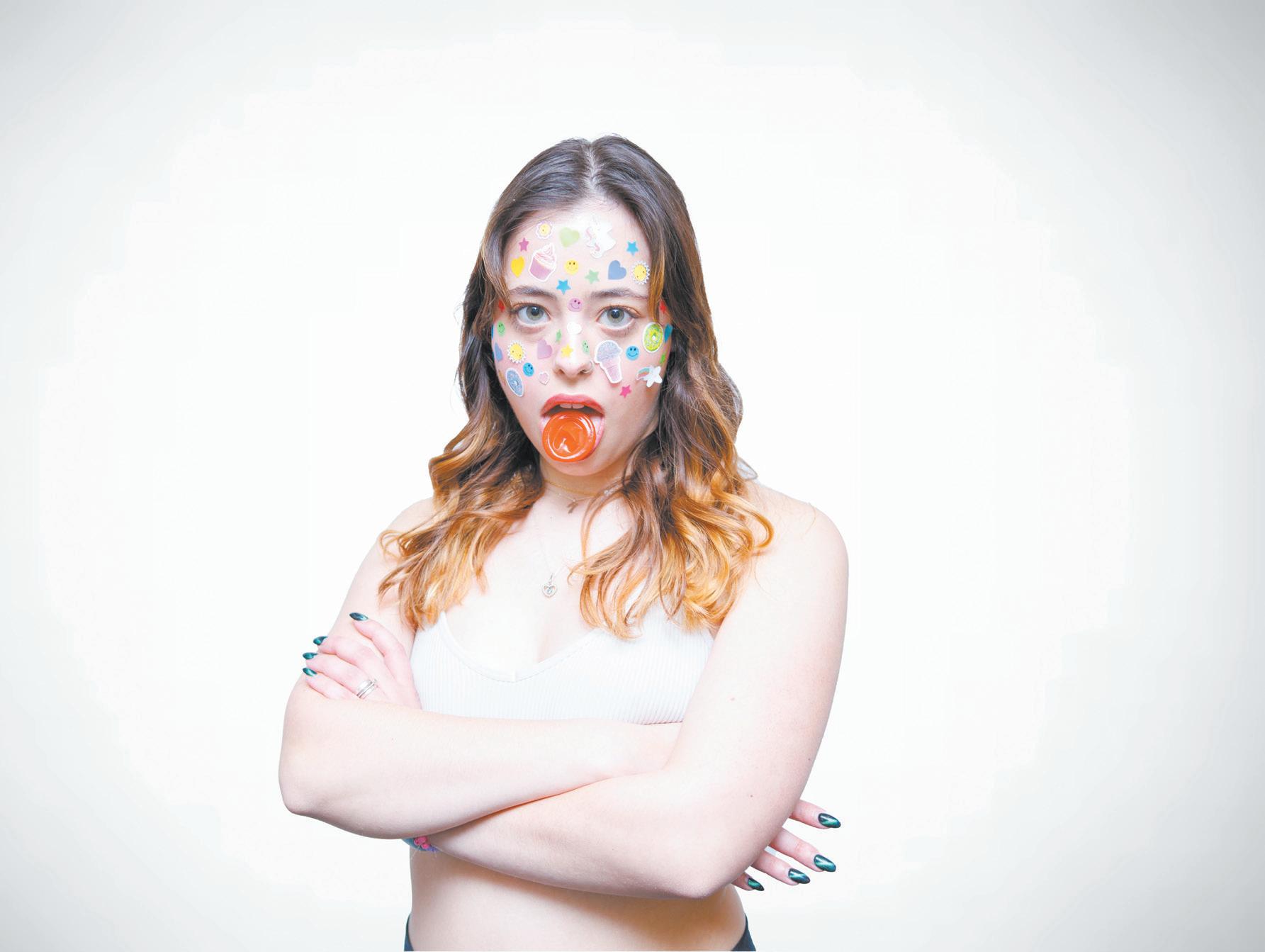









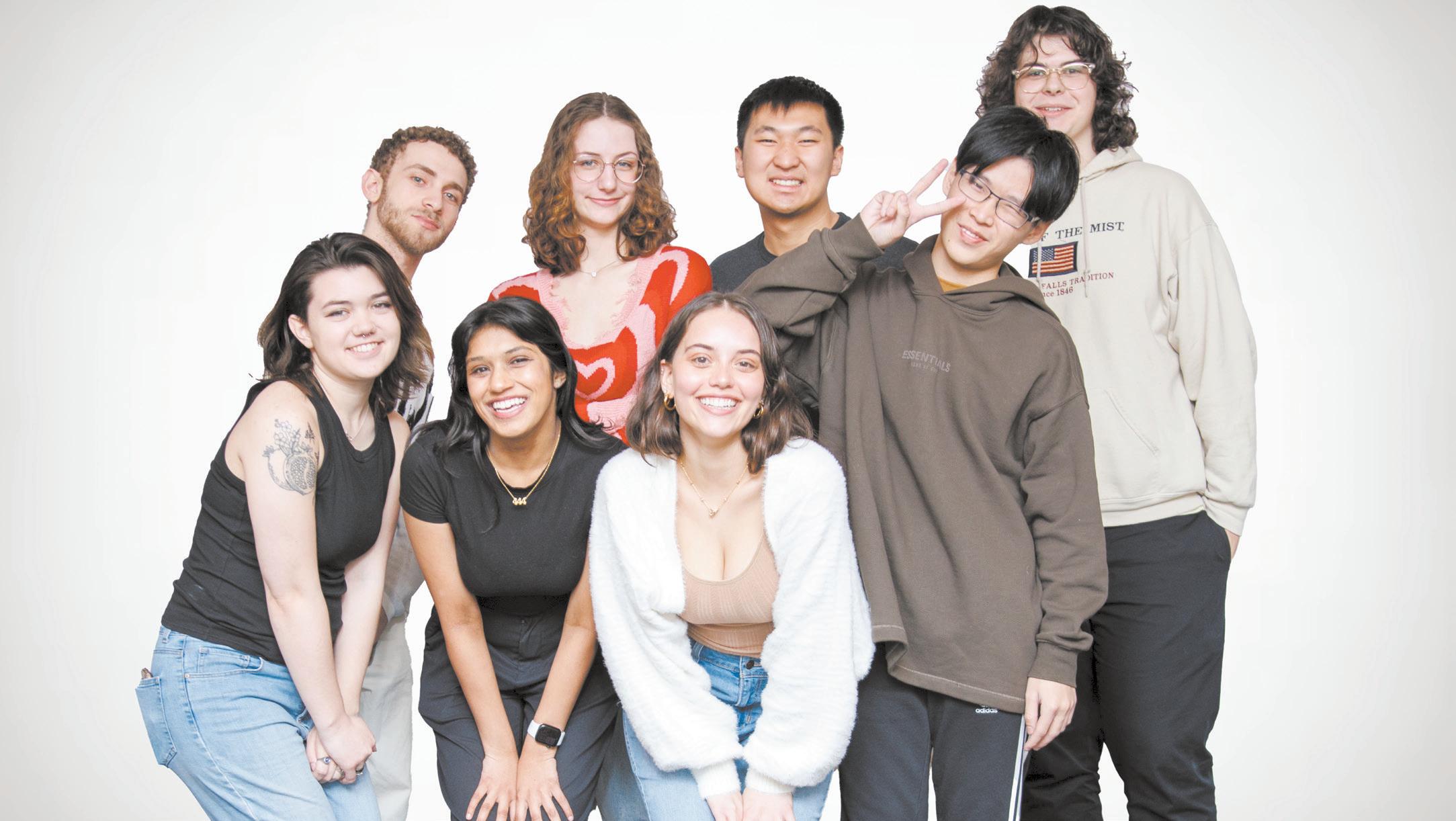
 BY COBY NUNBERG/THE STATESMAN
BY COBY NUNBERG/THE STATESMAN
What is romantic love if not kind and truthful? Young adults build up happily-everafter romances that are supposed to make them fulfilled. As a result, they seek relationships filled with such ideals of honesty and hope. However, film and television portrayals of toxic relationships take on many forms, ultimately shaping how people perceive romance and intimacy within their relationships. While the media can positively impact this perception, it can also create a misconstrued idea of a healthy relationship.
It often does so by portraying intense verbal and physical arguments and emotions as signs of passionate love while targeting tween and teenage audiences. These “heat of the moment” experiences become misconstrued because of the conventionally attractive “hot and sexy” male archetype coming off as brooding with a heart of gold. Through heated disagreements and overly dramatic confrontations that explode into potential emotional abuse, the audience often considers overblown emotional turmoil as deep and passionate romance.
In the 2000s, we saw an abundance of toxicity in television, particularly in the New York City teen drama “Gossip Girl,” which featured dynamic and toxic relationships misrepresented as passionate ones. For Generation Z culture, it became more than just a series — it evolved into a cultural phenomenon, with audiences witnessing the pitfalls of toxicity while perceiving the relationships as “goals.”
Take Chuck Bass, played by Ed Westwick, and Blair Waldorf, played by Leighton Meester: the quintessential toxic couple of not only the iconic series but of the entire mid-2000s that normalized abuse. For example, in the third season, Chuck, driven by his power-hungry desires, makes a deal with his Uncle Jack and agrees to sacrifice his relationship with Blair in exchange for
More recently, the psychological thriller series “You” on Netflix and “Euphoria” on HBO both portray toxicity at its finest.
In the Netflix original show “You,” serial killer protagonist Joe Goldberg, played by Penn Badgley, is characterized by his obsessive and stalking tendencies — killing at least 18 characters throughout the four seasons. In the fourth season, Joe returns to his old ways after murdering his previous love interest Love Quinn, played by Victoria Pedretti, and has found love with Kate Galvin, played by Charlotte Ritchie.
But Joe is stalking his nemesis, Adam Pratt, and is convinced that he must outsmart him before he blames a slew of murders on him. Joe’s obsessive tendencies are detrimental in and of themselves, and adding a fifth (and thankfully, final) season of this show plays into the romanticized perceptions of obsession, despite various storylines placing Joe in romantic situations.
dark, sultry music. These artistic choices, however, can inadvertently romanticize the problematic elements of Nate and Cassie’s relationship, such as manipulation and Nate’s ongoing fixation on Cassie as well as her personal emotional insecurities.
Contrastingly, examples of healthy relationships in television and film include Chandler Bing, played by Matthew Perry, and Monica Geller, played by Courteney Cox, in the iconic sitcom “Friends.” Their relationship thrives on open communication, mutual respect and genuine affection for each other, setting a positive example for what a healthy relationship should look like.
ownership of the hotel he wants. Manipulating Blair to achieve this materialistic goal is simply unforgiveable.
Through competition for both power and control, manipulation was a trademark for this couple. At the time, this idealization of a conventionally attractive man was consistent with the caricature of the entitled and misogynistic man who still had a heart. But why does it still have such a strong influence on people to this day?
Instead of featuring a vibrant and optimistic display of love, characters who are supposed to engage in romantic gestures are actually controlling, possessive and manipulative individuals. It’s easy to get wrapped up in the passionate and intense romance portrayed in the media but this ignorance leads us to dismiss the red flags in an unhealthy and potentially abusive relationship.
“Saltburn” (2023) is an example of such toxic elitism in film, making viewers question what the definition of romance really is. This black comedy film portrays scholarship student Oliver Quick, played by Barry Keoghan, who becomes fixated with a popular, aristocratic student, Felix Catton, played by Jacob Elordi, before he is invited to the family’s estate.
Oliver’s unhealthy obsession with Felix entangles him in a web of deceit and desire masqueraded as love. Rather, Oliver abuses love and sex to achieve his desires; however, this display of toxicity is detrimental. This contributes to conflation between what is considered a healthy romantic relationship and that of harmful destruction.
We’ve all heard that “love is pain.”
Romantic relationships aren’t supposed to be easy, but they shouldn’t be painful either.
The media, especially film and television, creates unrealistic stereotypes that all romantic relationships should be painful and challenging, and that love and pain are intertwined.
In the same realm, “Euphoria” confronts issues of harm through the character Nate Jacobs, played by Jacob Elordi. The series blatantly acknowledges the character’s damaging nature, ultimately exposing the dark realities of detrimental behavior, particularly within Nate’s tumultuous relationship with Cassie Howard, played by Sydney Sweeney, as both fail to navigate or understand their emotions. As the show attempts to depict the harsh truths of toxicity, it uses ethereal cinematography as well as
Similarly, the bond between Harry Burns, played by Billy Crystal, and Sally Albright, played by Meg Ryan, in the 1989 romantic comedy “When Harry Met Sally…” highlights the importance of honesty and emotional intimacy when nurturing an authentic connection. These relationships highlight the importance of communication and genuine affection, defining the characteristics of healthy relationships.
While some audiences may view the media as a reflection of society, the blurred lines between love and manipulation in its portrayals of romantic relationships have severe consequences. Love — if portrayed authentically for young audiences — can be a lens to show growth, maturity and healthy love. However, it first must be freed from the influence of manipulation and toxicity.


Love reaches every corner of our culture, especially the music industry. Throughout the years, artists have consistently released tracks centered on romantic relationships, exploring both toxic and healthy dynamics. Here’s a recap of some of the most noteworthy love-focused albums from the past five years.
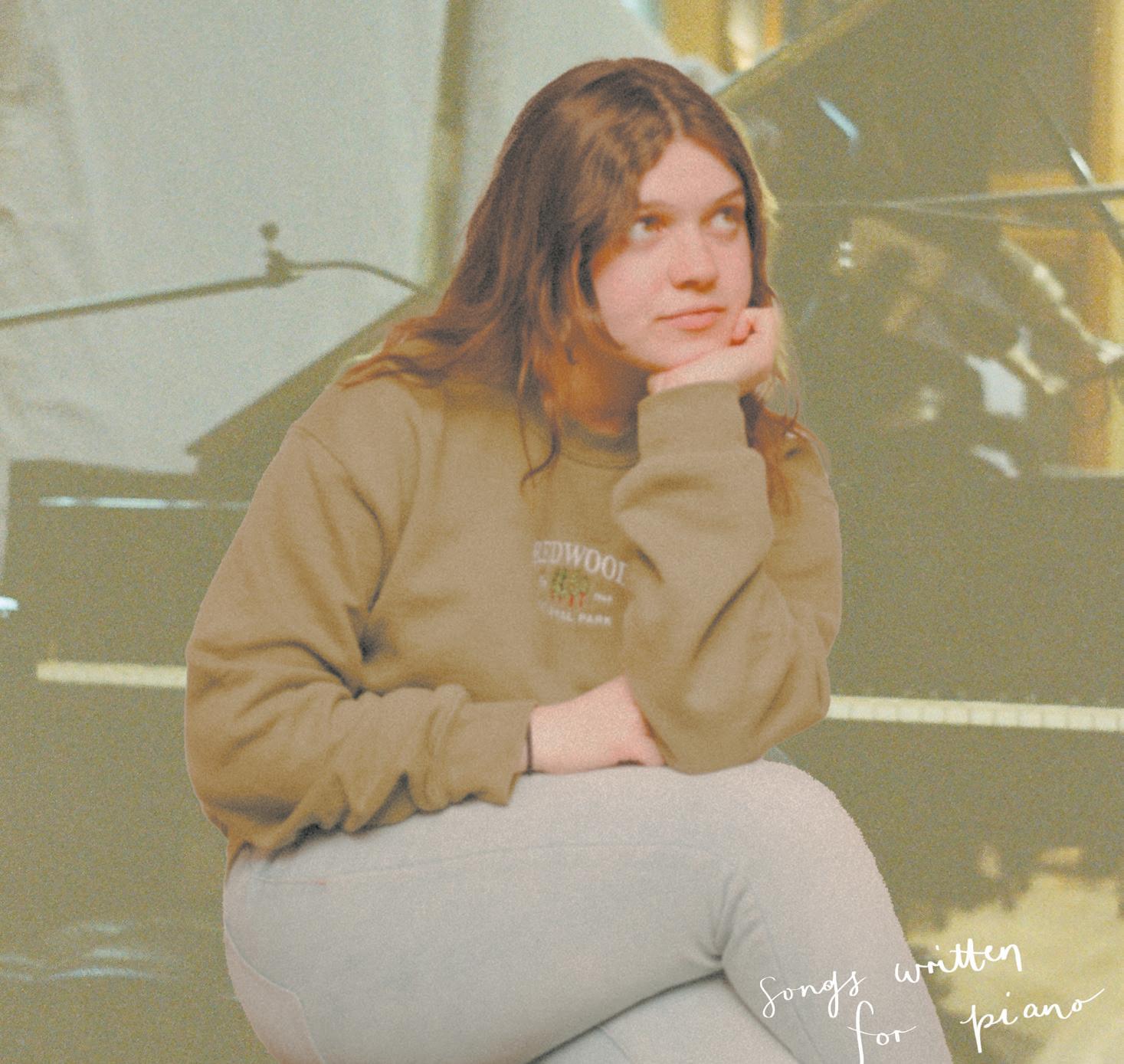
“songs written for piano” (2022)
Scottish singer-songwriter Katie Gregson-MacLeod’s music carries an intimate melancholy and aching resonance. Listeners can hear her soft cries echoing through every note, whether through headphones or speakers. Her debut extended play (EP), titled “songs written for piano,” is a vulnerable and introspective musical journey characterized by its piano ballads and intimacy. The EP follows a chronological story of the tumultuous period between ages 18 and 21, capturing where life’s uncertainties take shape. Gregson-MacLeod details her first heartbreak at age 18, as well as the complexities of both toxic and healthy relationships.

Olivia Rodrigo’s debut album “SOUR” is dedicated to adolescence and the aftermath of a failed, toxic relationship. The title itself refers to the bitterness and resentment that comes with the dissolution of said relationship, capitalizing on young heartbreak. The album — which explores pop subgenres from alternative pop to bedroom pop to pop-punk — delves into the struggles of navigating heartbreak as a teen. Rodrigo writes relatable and vulnerable music for her audience of largely Generation Z listeners. Her reflective lyricism, written from her personal experiences, seeps through as she explores challenges within a relationship as a 17-year-old.
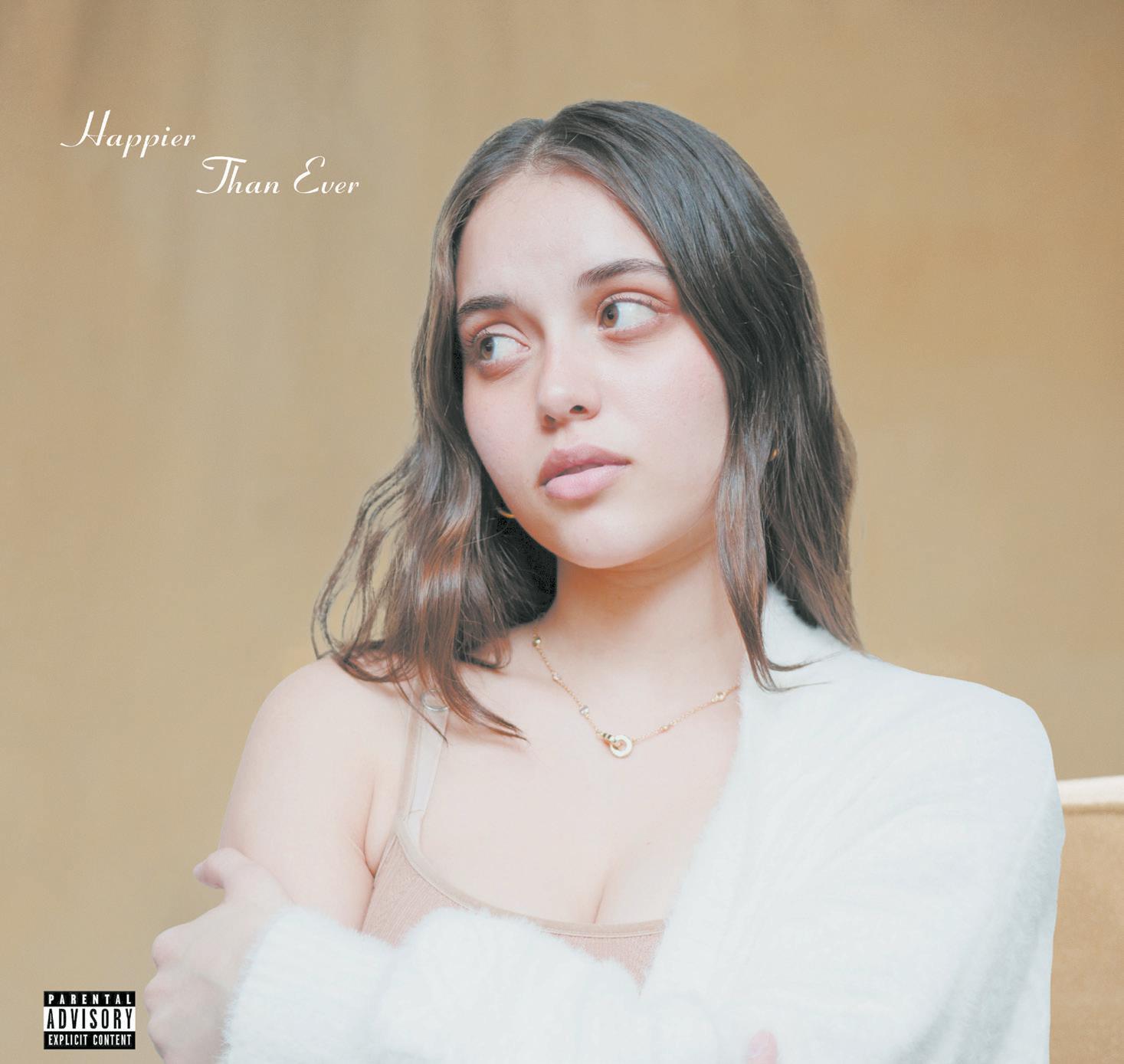
“Happier Than Ever” (2021)
In her sophomore album “Happier Than Ever,” Billie Eilish sings honestly about breakups, stardom and the downsides to fame. In the subdued, downtempo and jazz-infused pop songs, Eilish carries more of an introspective tone compared to her previous works, as highlighted by some of the spoken word interludes and ballads that explore what young women in the entertainment industry are subjected to by the media and public commentary. Recurring themes of sexual and emotional abuse as well as body image issues appear throughout the album before exploding into love-induced rage in the titular, breakup ballad-turned-rock song. The album, filled with deeply personal self-reflection, carries strong themes of Eilish’s emotional growth and female empowerment.
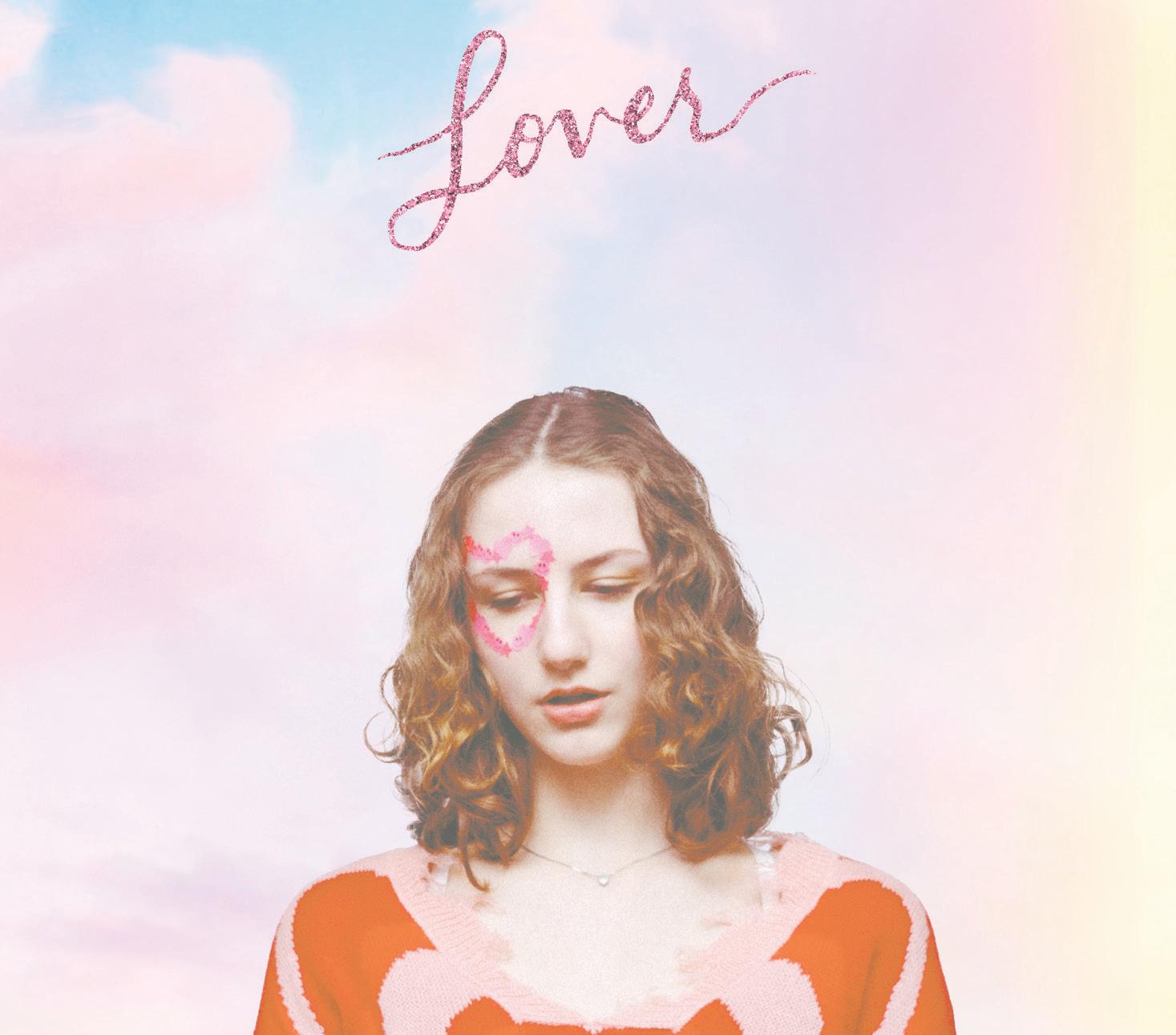
“Lover” (2019)
Following Taylor Swift’s withdrawal from the public eye, which was captured in her previous album “reputation” (2017), Swift’s seventh album, “Lover,” returned with upbeat and bright love songs that mark a turn in Swift’s confidence and commitment to love, relationships and selfassurance. The bright pastel rainbow cover alludes to the album’s themes of love, attraction and positivity, spotlighting the importance of LBGTQ+ rights and feminism. The 1980s-inspired electro-pop and synth-pop sound blends brilliantly with Swift’s signature poignant songwriting, including love letters that range from forgetting about vengeance toward her wrong-doers to confessional tongue-in-cheek lyrics to a partner.
Marissa McCandless recreates Katie Gregson-MacLeod’s album “songs written for piano.” ILLUSTRATED AND PHOTO BY STANLEY ZHENG/THE STATESMAN Brittney Dietz recreates Billie Eilish’s album “Happier Than Ever.” ILLUSTRATED AND PHOTO BY STANLEY ZHENG/THE STATESMANEditor-in-Chief.................Viola Flowers
Managing Editor.......Lori Saxena
Managing Editor.......Skylar Sena
News Editor......................................................Sonya Gugliara
Opinions Editor Sara McGiff
Sports Editor....................................................Mike Anderson
Arts & Culture Editor...........................................Jenna Zaza
Multimedia Editor...........................................Brittney Dietz
Copy Chief.............................................................Olivia Erndl
Asst. News Editor..........................................Mariam Guirgis
Asst. News Editor................................................Sky Crabtree
Asst. News Editor............................................Mariam Ismail
Asst. Opinions Editor.......................................Aloki Pandya
Asst. Opinions Editor...................................Vinod Kripalani
Asst. Sports Editor..........................................Kenny Spurrell
Asst. Sports Editor...........................................Alex Streinger
Asst. Sports Editor......................................Anthony DiCocco
Asst. Arts & Culture Editor............................Clare Gehlich
Asst. Arts & Culture Editor...............................Emily Chao
Asst. Multimedia Editor.........................Mackenzie Yaddaw
Asst. Multimedia Editor............................Angelina Livigni
Asst. Multimedia Editor.................................Stanley Zheng
Asst. Copy Editor...............................................Sarah Aguiar
Asst. Copy Editor.........................................Alyssa Pascocello
Advertising Manager..........................Dimitrios Santiago Website Manager..............................................Liam Cooke
To contact the Editor-in-Chief and Managing Editors about organizational comments, questions, suggestions, corrections or photo permission, email editors@sbstatesman.com.
The Statesman is a student-run, student-written incorporated publication at Stony Brook University in New York. The paper was founded as The Sucolian in 1957 at Oyster Bay, the original site of Stony Brook University. In 1975, The Statesman was incorporated as a not-for-profit, student-run organization. Its editorial board, writers and multimedia staff are all student volunteers.
The Statesman and its editors have won several awards for student journalism and several past editors have gone on to enjoy distinguished careers in the field of journalism.
Disclaimer: Views expressed in columns or in the Letters and Opinions section are those of the author and not necessarily those of The Statesman. 10
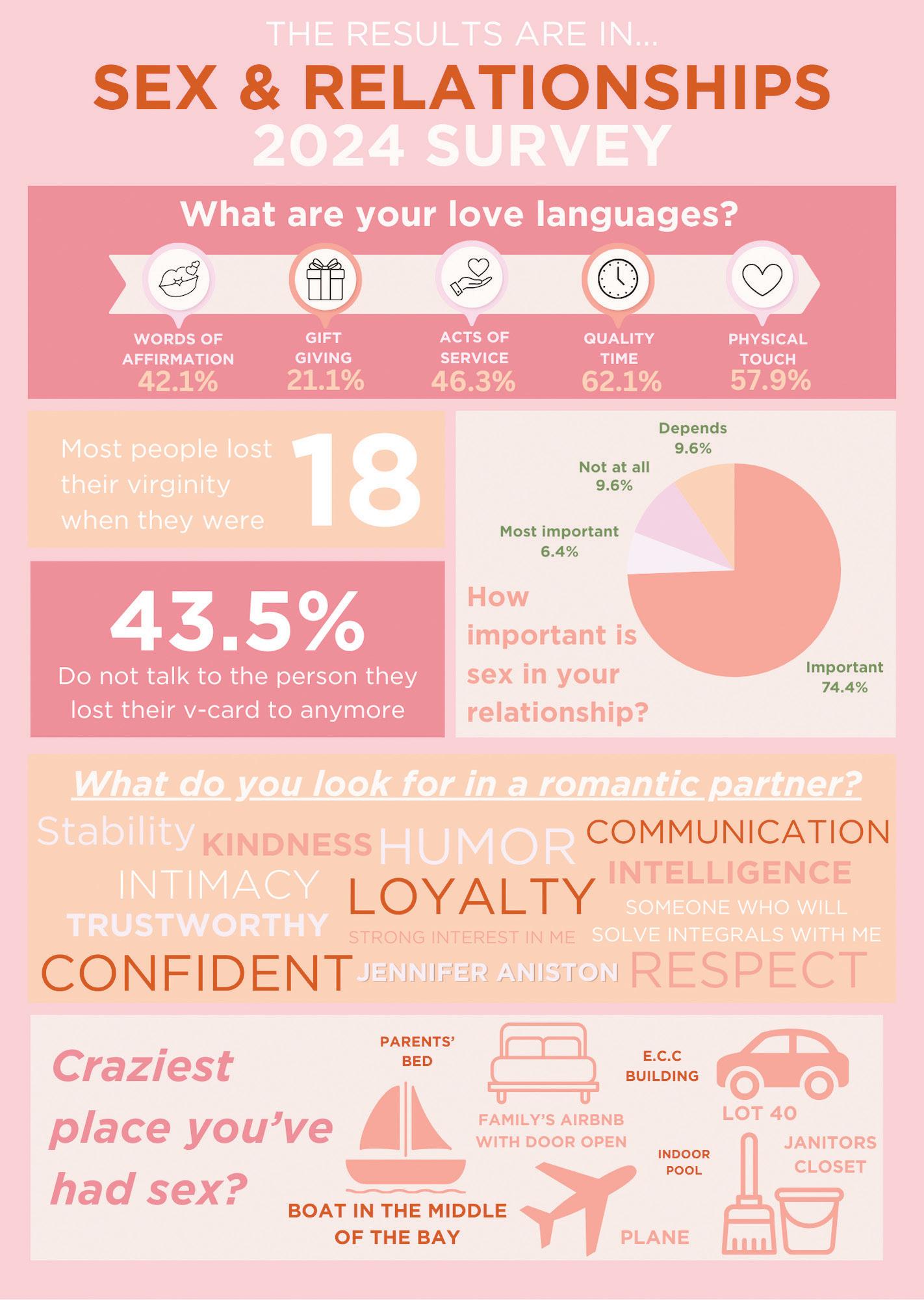
Continued from page 9

“Norman F****** Rockwell!” (2019)
Romance and love are presented in intricate, multi-dimensional forms in Lana Del Rey’s sixth album, “Norman F****** Rockwell!,” which came two years after “Lust for Life” (2017). Across 14 tracks, Del Rey explores the dark complexities of human connection that often arise with romantic relationships, such as betrayal and longing. The album blends classic rock elements with piano ballads, with its title drawing inspiration from the painter and illustrator Norman Rockwell, who is known for his vivid portrayals of everyday American life. With her nostalgic lyrical sentiments and deep, sultry voice, Del Rey navigates themes of emotional intimacy and heartbreaking disillusionment.
Through their melodies and lyrics, these albums are snapshots of the complexities of love and heartbreak. By showcasing raw vulnerability, these five artists offer a glimpse into the highs and lows of romance, inviting listeners to explore the emotions that bridge the gap between reality and music.
Isha Shah and Jerry Weintraub recreate Lana Del Rey’s album “Norman F****** Rockwell!.” ILLUSTRATED AND PHOTO BY STANLEY ZHENG/THE STATESMANSocial media is influential in shaping adolescents’ decision-making skills. With the rise of relationship gurus, teenagers’ perceptions of love are morphing into unrealistic and hardto-achieve standards. Dating coaches now give advice stemming from sexist content, leaving an impressionable mark on young adults. Content creators such as TikToker Shera Seven have interesting takes on relationships that often stray users from their original values and overall goals concerning relationships.
Young adults and adolescents ranging in age from 15 to 21 are on journeys of self-discovery. In an age where technology dominates our social interactions, navigating the dating world can be challenging as it is.
My parents are first-generation Muslim immigrants from the Ivory Coast in West Africa. The only piece of advice I’ve received surrounding the topic of dating was to “wait until marriage before having sex.” Culture, religion, sex and sexual orientation all come into play when navigating dating culture. At times, it seems like the only practical way to avoid asking a parental figure embarrassing questions would be to get advice from social media influencers.
With platforms such as TikTok, Instagram and X (formerly known as Twitter), dating advice is being shown to users with targeted algorithms. Although I have not personally sought out advice from relationship gurus, I often find myself listening to these creators and
their narratives. Seven has interesting takes on the role of finances are in relationships; according to Seven, if a woman and her partner split household expenses, the woman should cheat on them and find a man willing to pay all of the expenses.
With takes like her iconic “sprinkle, sprinkle” phrase — the belief that dating should be transactional — Seven has swayed the way I look at dating and relationships. I often find myself entertained and agreeing with her ideology of being in financially beneficial relationships. After watching her videos, I questioned my own dating history and asked myself what my former relationships have provided me. This type of content encourages me to question if my past and future partners have been or will be financially beneficial.
Although this creator has changed my perspective, I can also reflect on how harmful this rhetoric can be. She suggests that women should be financially dependent on a man and should pick their partners based on financial gain. While entertaining to view, the advice that relationship gurus offer should be taken with a grain of salt. Giving advice that one should be financially dependent on a man is especially harmful to young girls, as money should not always be a top priority when navigating relationships. Money can cloud judgment and lead to an imbalance of power dynamics in relationships, leading one party to have more influence and control.
It’s unlikely that the average teenage girl could depend on teenage boys to be financially independent and provide for both parties, which has raised concern among Seven’s viewers.
Seven has suggested that viewers who want better financial results should date older men. The finance-based premises of agegap relationships are extremely harmful, as young women are vulnerable and regularly preyed on by older, financially stable men. There should be a trigger warning on all social media platforms when advising young women to date older men for financial gain, as these relationships can rapidly take a turn for the worse.
Although no one is required to watch this content, these relationship gurus have a significant influence on the developing mind and receive millions of views, which equates to thousands of dollars.
The main purpose of these creators providing dating advice is to grab the attention of thousands to obtain views for their own personal gain. There are plenty of dangers in advising young women to date solely for money and the best relationship outcomes. Even being vigilant can’t prevent unforeseen negative outcomes from participating in these types of transactional relationships, especially when the content that Seven makes generates thousands of views and has multiple commenters agreeing with her stances. As a result of this type of content, some members of Generation Z have
suggested that receiving gifts and trips from a man are things to brag about.
Relationship gurus often exploit people who want lifestyles that are not sustainable for the average person. Social media users have contributed to the glamorization of young women being viewed as “kept women” or “trad wives” by encouraging women to believe that there is a problem with being attractive but not receiving compensation for existing.
The promotion of this lifestyle can also take a toll on young men’s attitudes toward relationships as well, as the harmful rhetoric places worth on how much a man’s income is. This would suggest that young men should to earn money to take care of a woman; they should be able to derive their worth in relationships from within, entirely divorced from anything financial.
The way that teenagers make decisions, especially when it comes to relationships, is greatly influenced by social media. Teenagers’ unrealistic expectations of love have been shaped by the rise of relationship gurus on social media sites. By negatively influencing impressionable young adults, dating coaches regularly give out advice based on sexist and gender-baiting content. Although content creators such as Seven present intriguing viewpoints on relationships, their rhetoric tends to pull users away from realistic dating expectations, further warping teenagers’ perceptions.
